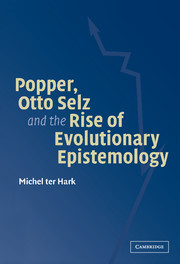Book contents
- Frontmatter
- Contents
- List of Illustrations
- Preface
- 1 Tracing the Genesis of an Idea
- 2 Psychology of Thinking, Evolutionary Theory, and Psychoanalysis
- 3 Popper and the Foundations of Pedagogy
- 4 Otto Selz and the Science of Problem Solving
- 5 Popper's Psychology of Knowledge
- 6 Evolutionary Epistemology and the Mind-Body Problem
- Notes
- Bibliography
- Index
6 - Evolutionary Epistemology and the Mind-Body Problem
Published online by Cambridge University Press: 07 December 2009
- Frontmatter
- Contents
- List of Illustrations
- Preface
- 1 Tracing the Genesis of an Idea
- 2 Psychology of Thinking, Evolutionary Theory, and Psychoanalysis
- 3 Popper and the Foundations of Pedagogy
- 4 Otto Selz and the Science of Problem Solving
- 5 Popper's Psychology of Knowledge
- 6 Evolutionary Epistemology and the Mind-Body Problem
- Notes
- Bibliography
- Index
Summary
Evolutionary Epistemology and the Theory of the Searchlight
When Popper in a talk on evolutionary epistemology triumphantly claimed that his theory of knowledge, with its emphasis on the method of trial-and-error elimination, overturned everything his predecessors had said up to now, his target was not only the British empiricism of Locke and Hume but also the attempts of his boyhood friend Konrad Lorenz to apply evolutionary theory to traditional epistemology. Popper was surely correct in distinguishing his theory from Lorenz's, yet the distinctive features of his evolutionary stance are not as revolutionary as he claims but are firmly rooted in German Denkpsychologie. The fundamental distinction between Popper and Lorenz revolves around their relation to Kant's notion of a priori knowledge. Whereas Lorenz (like Herbert Spencer did much earlier) uses evolutionary theory to reshape a priori knowledge in the image of Locke's empiricism, Popper retains the original Kantian idea that there is, genetically, an a priori element in all forms of knowledge, including perceptual knowledge. His specific view of this a priori element clearly shows the heritage of the – Kantian – programme of German Denkpsychologie, notably Selz. To put this view briefly: (perceptual) knowledge is always preceded by anticipations, problems, or theories.
Before explaining these differences between Popper and Lorenz in more detail it is instructive to have a look at Jennings's earlier attempt to apply evolutionary theory to epistemology.
- Type
- Chapter
- Information
- Popper, Otto Selz and the Rise Of Evolutionary Epistemology , pp. 153 - 190Publisher: Cambridge University PressPrint publication year: 2003



